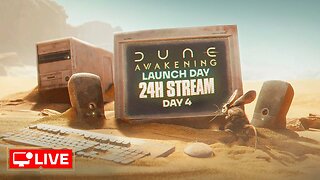Premium Only Content

WEATHER FORECASTS SUCK
Get a winter parka here... https://geni.us/8YvBMy6
https://www.amazon.com/shop/petervonpanda
Join this channel to help me bring you more vids...
https://www.youtube.com/channel/UCS-ix9RRO7OJdspbgaGOFiA/join
Join the free von Panda group here... https://panda-research-institute.mn.co
Get Peter von Panda gear here... https://petervonpanda.storenvy.com/
Instagram... https://www.instagram.com/petervonpanda/
As an Amazon Associate I earn from qualifying purchases.
Weather forecasting is the application of science and technology to predict the conditions of the atmosphere for a given location and time. People have attempted to predict the weather informally for millennia and formally since the 19th century. Weather forecasts are made by collecting quantitative data about the current state of the atmosphere at a given place and using meteorology to project how the atmosphere will change.
Once calculated by hand based mainly upon changes in barometric pressure, current weather conditions, and sky condition or cloud cover, weather forecasting now relies on computer-based models that take many atmospheric factors into account.[1] Human input is still required to pick the best possible forecast model to base the forecast upon, which involves pattern recognition skills, teleconnections, knowledge of model performance, and knowledge of model biases. The inaccuracy of forecasting is due to the chaotic nature of the atmosphere, the massive computational power required to solve the equations that describe the atmosphere, the error involved in measuring the initial conditions, and an incomplete understanding of atmospheric processes. Hence, forecasts become less accurate as the difference between current time and the time for which the forecast is being made (the range of the forecast) increases. The use of ensembles and model consensus help narrow the error and pick the most likely outcome.
There are a variety of end uses to weather forecasts. Weather warnings are important forecasts because they are used to protect life and property. Forecasts based on temperature and precipitation are important to agriculture, and therefore to traders within commodity markets. Temperature forecasts are used by utility companies to estimate demand over coming days. On an everyday basis, people use weather forecasts to determine what to wear on a given day. Since outdoor activities are severely curtailed by heavy rain, snow and wind chill, forecasts can be used to plan activities around these events, and to plan ahead and survive them. In 2009, the US spent $5.1 billion on weather forecasting.[2]
It was not until the invention of the electric telegraph in 1835 that the modern age of weather forecasting began.[11] Before that, the fastest that distant weather reports could travel was around 160 kilometres per day (100 mi/d), but was more typically 60–120 kilometres per day (40–75 mi/day) (whether by land or by sea).[12][13] By the late 1840s, the telegraph allowed reports of weather conditions from a wide area to be received almost instantaneously,[14] allowing forecasts to be made from knowledge of weather conditions further upwind.
The two men credited with the birth of forecasting as a science were an officer of the Royal Navy Francis Beaufort and his protégé Robert FitzRoy. Both were influential men in British naval and governmental circles, and though ridiculed in the press at the time, their work gained scientific credence, was accepted by the Royal Navy, and formed the basis for all of today's weather forecasting knowledge.[15][16]
Beaufort developed the Wind Force Scale and Weather Notation coding, which he was to use in his journals for the remainder of his life. He also promoted the development of reliable tide tables around British shores, and with his friend William Whewell, expanded weather record-keeping at 200 British Coast guard stations.
Robert FitzRoy was appointed in 1854 as chief of a new department within the Board of Trade to deal with the collection of weather data at sea as a service to mariners. This was the forerunner of the modern Meteorological Office.[16] All ship captains were tasked with collating data on the weather and computing it, with the use of tested instruments that were loaned for this purpose.[17]
-
 8:50
8:50
Peter von Panda
1 year agoV-Line Under Desk Safe Has A Cool Lock
1.29K1 -
 LIVE
LIVE
The Bubba Army
21 hours agoLA is a THIRD WORLD Sh*t Show! - Bubba the Love Sponge® Show | 6/11/25
12,370 watching -
 12:08
12:08
The Illusion of Consensus
13 days agoRav Arora vs Mark Cuban DEBATE On Whether Joe Rogan Was Right On Covid Vaccines For Young People
11.9K23 -
 17:12
17:12
Paul Barron Network
15 hours ago$SBET🚨Ethereum Epic Short Squeeze Incoming!?🔥
22.4K2 -
 LIVE
LIVE
Lofi Girl
2 years agoSynthwave Radio 🌌 - beats to chill/game to
1,428 watching -
 LIVE
LIVE
tacetmort3m
54 minutes ago🔴 LIVE 24H - OFFICIAL LAUNCH DAY - DUNE AWAKENING DAY 4 (PART 2)
8 watching -
 2:05:44
2:05:44
Side Scrollers Podcast
20 hours agoCalifornia is LOST, YouTube LOOSENS Rules, YouTuber SHOT Over Beef + More | Side Scrollers Live
32.7K30 -
 5:11:42
5:11:42
B2ZGaming
5 hours agoDivision 2 | B2Z Gaming
18.5K -
 11:11
11:11
MattMorseTV
16 hours ago $2.08 earnedNewsom's FUNDING just got EXPOSED.
41.9K88 -
 8:07
8:07
Dr. Nick Zyrowski
6 days agoHigh Dose Vitamin D Increases Fat Loss & Muscle Growth - New Study
26.1K8